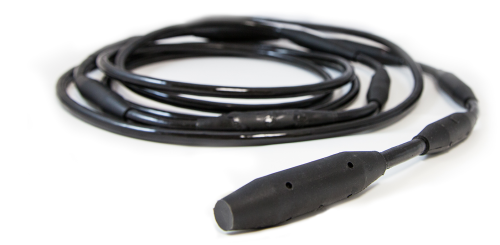
Digital temperature measurements






Visão Geral
The CS225 is a prime example of our commitment to provide the highest-quality monitoring products in the world. Our revamped design, rigorous validation process, and stringent quality standards are all focused on providing the fantastic quality you require to reliably generate data you can trust, even in the harshest of environments. Learn more about the CS225's quality testing and validation process.
The CS225 temperature string uses multi-point temperature profiles and SDI-12 digital technology for simple integration and reliability. The CS225 consists of an arrangement of temperature sensors mounted in rugged steel-reinforced cable, permitting it to be buried, submerged, or integrated directly into structures. Temperature points are over-molded to provide long-term protection in all mediums. Each CS225 is custom manufactured.
Temperature profiling with the CS225 is suited for a wide variety of applications and environments, including the following:
- Borehole temperature profiling and borehole ground measurement
- Measuring geothermal heat gradient
- Lake stratification and thermal stratification measurement
- Soil temperature profiles
- Water temperature profiling
- Frost heave monitoring
- Active layer thickness permafrost monitoring and permafrost depth measurement
- Talik ground temperature
- Heat flow measurement
Benefícios e Características
- One SDI-12 channel is used to connect all temperature sensors
- Low power—suitable for remote applications
- No calibration required
- Comprehensive measurement range
- Makes use of the included SGB3 to protect against electrical surges
- Extremely rugged and thoroughly tested
imagens



Produtos Relacionados
Descrição Técnica
Rigorous Quality Testing of the CS225 Temperature String
We know clients need a really tough temperature string. These strings will be pulled through conduit, buried under concrete, frozen underground, and submersed in water, so quality is of the utmost importance. We put the CS225 through various tests to ensure it can withstand bending, pulling, pressure, freeze/thaw cycles, and temperature cycles. This series of tests confirmed the physical and electrical integrity of the CS225.
When power is supplied to the CS225 probe, the internal electronics will continuously measure the temperature at an approximate rate of 1 measurement per second. Every output measurement obtained from the sensor is a running average of 10 consecutive 1-second readings. The accuracy specification is based on an average of 10 consecutive readings. For this purpose, after initial power-up, it is recommended to delay 10 seconds to obtain the best accuracy.
Because the sensor is obtaining a measurement every 1 second, it is recommended to use the Continuous measurement command to obtain the temperature readings. Using the “R” commands will reduce the time taken to obtain a reading with the SDI-12 protocol.
Compatibilidade
Please note: The following shows notable compatibility information. It is not a comprehensive list of all compatible products.
Data Loggers
| Product | Compatible | Note |
|---|---|---|
| CR1000 (retired) | ||
| CR300 (retired) | ||
| CR3000 (retired) | ||
| CR350 | ||
| CR6 | ||
| CR800 (retired) | ||
| CR850 (retired) |
Additional Compatibility Information
Configuration
Our handy CS225 Configuration Tool can help you configure your string, and it assists our staff with customizing your string to your specifications. It includes parameters for lead length, first sensor from ground, and distance between sensors.
Especificações
| Operating Temperature Range | -55° to +85°C |
| Typical Accuracy | ±0.2°C (-40° to +85°C) includes lifetime drift |
| Worst Case Accuracy |
|
| Resolution | 0.0078°C |
| Maximum Pressure | 150 psi |
| Communications | SDI-12 |
| Maximum Sensors per Probe | 36 |
| Minimum Spacing | 15 cm (5.91 in.) |
| Supply Voltage | 9 to 28 Vdc |
| Current Consumption |
|
| Warm-up Time on Power up | 10 s |
| Temperature Point Diameter | 2.22 cm (0.875 in.) |
| Maximum Cable Length | 152 m (500 ft) |
| User-resettable min/max temperature recording | Yes |
| Min/max temperature recording duration | Lifetime |
| Automatic temperature update interval | 1 s |
Documentos Relacionados
Lâminas do produto
Manuais
Conformidade
Downloads
CS255 Program Examples (4 KB) 26-08-2021
Three example programs that measure the temperature sensors on the CS225 probe. The number of temperature sensors and the SDI-12 control terminal are entered as constants at the beginning of the programs to allow users to easily change them to match their application. The example programs support the CR6 and CR1000X data loggers. Programming for other dataloggers will be similar.
The cs225.CRB program measures 20 sensors with SDI-12 addresses 1 through 9 and A through F. Every 60 s, the aR0! command polls each temperature sensor, then the data is stored in a table. Other common station data is measured every 60 seconds and stored to a daily data table.
The cs225-slow.CRB program measures 20 temperature sensors with SDI-12 addresses 1 through 9 and A through F. The program uses the SlowSequence instruction and the aR0! command to poll each temperature sensor every 60 seconds. The temperature sensor data is stored to a data table on the same interval. Other common station data is measured every 5 seconds and stored to daily and hourly data tables.
The cs225-metdata.CRB program measures 15 sensors with SDI-12 addresses 1 through 9 and A through F. Each temperature sensor is polled on power up and daily with the aR1! command to determine metadata, which is stored in a daily data table. Other common station data is measured every 60 seconds and stored to a separate daily data table.



